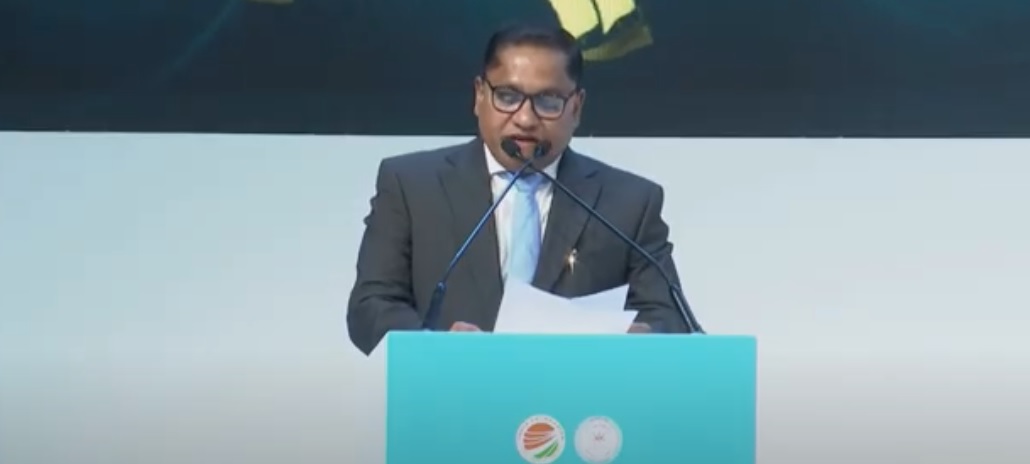Vijitha Sails the Indian Ocean in Search of Prosperity: A Vision for Regional Cooperation and Growth
Sri Lanka’s Vision for a Prosperous Indian Ocean: Foreign Minister’s Speech at the 8th Indian Ocean Conference

At the 8th Indian Ocean Conference held in Muscat, Oman, Sri Lankan Foreign Minister Vjitha Herath made a compelling case for the untapped potential of the Indian Ocean and the need for regional cooperation to unlock its vast economic benefits. His speech emphasized the importance of collaboration among nations to harness the ocean’s opportunities, address shared challenges, and work toward a prosperous future for all.
Unlocking the Indian Ocean’s Economic Potential
The Indian Ocean is a critical hub for global trade, with over 80% of global trade by volume transported via sea. Minister Herath pointed out that, while the economic opportunities within the region are immense, many remain underutilized. He highlighted how key sectors such as sustainable fisheries, tourism, maritime trade, and energy resources could fuel economic growth, but stressed that these benefits can only be realized through collective action.
For instance, the Indian Ocean is a major fishing zone, contributing around 20% of the world’s fish catch according to the FAO. However, unsustainable practices such as overfishing and illegal fishing undermine this potential. Minister Herath emphasized the need for regional cooperation to foster sustainable fisheries management and protect marine ecosystems.
The region also has immense potential in tourism, particularly for island nations like the Maldives, Sri Lanka, and Seychelles. In 2019, tourism contributed about 5% of Sri Lanka’s GDP, while Seychelles relied on tourism for around 60% of its GDP. By working together to ensure environmental sustainability and safety, these nations can enhance their tourism sectors while preserving the beauty of the ocean.
Sri Lanka’s Role as a Maritime Hub
Sri Lanka’s Port of Colombo, one of the best-performing ports globally, is central to the country’s efforts to bolster maritime connectivity. The port is strategically located along key East-West shipping routes and services global trade routes between Asia, Europe, and Africa. Minister Herath mentioned that the Colombo West International Terminal, set to become operational soon, will increase the port’s capacity and solidify Sri Lanka’s position as a crucial player in global maritime trade.
In fact, the Port of Colombo handled over 6 million TEUs (Twenty-Foot Equivalent Units) in recent years, ranking it among the top 30 ports in the world. Minister Herath explained that the expansion of the port will allow Sri Lanka to continue to play an important role in the region’s economic growth, offering increased capacity for goods transported across the Indian Ocean.
The Urgency of Regional Cooperation
While the Indian Ocean offers significant opportunities, the region also faces critical challenges. Minister Herath called attention to rising sea levels, marine pollution, and overfishing—issues that threaten the ocean’s health and the livelihoods of coastal nations. According to the UNEP, the Indian Ocean is one of the regions with the highest levels of plastic pollution, with over 6.4 million metric tons of plastic entering the ocean every year.
The IPCC (Intergovernmental Panel on Climate Change) report highlights that sea levels in the Indian Ocean region have risen by 3.3 millimeters per year over the past 25 years. This rising tide threatens low-lying nations such as the Maldives and Sri Lanka, making it clear that climate resilience measures are crucial.
To address these challenges, Minister Herath stressed the importance of collaboration. He called for countries in the region to adopt cleaner technologies, such as cleaner fuels in maritime shipping, to reduce carbon emissions and protect marine biodiversity. Sri Lanka’s commitment to the BBNJ (Biodiversity Beyond National Jurisdiction) Agreement underscores this vision by supporting international efforts to ensure sustainable marine governance.

The Importance of Maritime Security
The safety of the Indian Ocean’s trade routes is another priority for Minister Herath. The region is home to key shipping lanes like the Strait of Hormuz, which carries about 20% of the world’s oil exports. Maintaining freedom of navigation is essential not only for global trade but also for regional security.
In his speech, Minister Herath emphasized the need for stronger regional security architectures and enhanced maritime domain awareness to address threats such as piracy and territorial disputes. The International Maritime Bureau (IMB) reported a sharp decline in piracy incidents in the Indian Ocean from over 200 attacks in 2011 to under 50 attacks in 2020, thanks to international cooperation. Minister Herath called for continued partnerships to ensure maritime stability, with countries working together to enhance intelligence-sharing and security coordination.
A Vision for Shared Prosperity
Minister Herath closed his speech by reaffirming Sri Lanka’s commitment to a future of peace, security, and prosperity in the Indian Ocean. He emphasized that the ocean’s economic potential cannot be realized in isolation but must be driven by shared goals and collective action. Through organizations like the Indian Ocean Rim Association (IORA), Sri Lanka is working to bring countries together to promote a stable, sustainable, and prosperous future for the region.
Sri Lanka’s role as the current chair of IORA allows the country to lead efforts to strengthen regional partnerships and ensure that all nations in the Indian Ocean share in the benefits of growth. Minister Herath stressed that Sri Lanka would continue to advocate for collaboration and mutual respect in tackling the region’s challenges, from maritime security to environmental protection.
Looking Ahead: Working Together for the Indian Ocean’s Future
In conclusion, Minister Herath’s speech called for a future where nations of the Indian Ocean rise above rivalry and cooperate to address the shared challenges they face. He stressed that regional collaboration, backed by sustainable practices and strong security frameworks, will ensure the long-term prosperity of the Indian Ocean.
By working together, the nations of the Indian Ocean can ensure that this vital region remains a source of growth, stability, and opportunity for generations to come. Sri Lanka, with its strategic location and commitment to cooperation, stands ready to play a leading role in realizing this vision.







